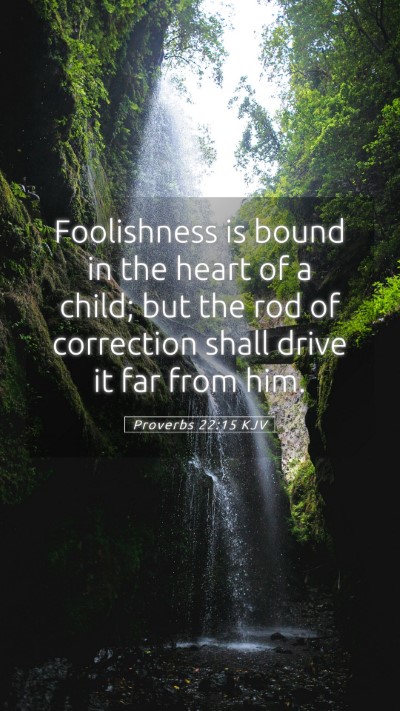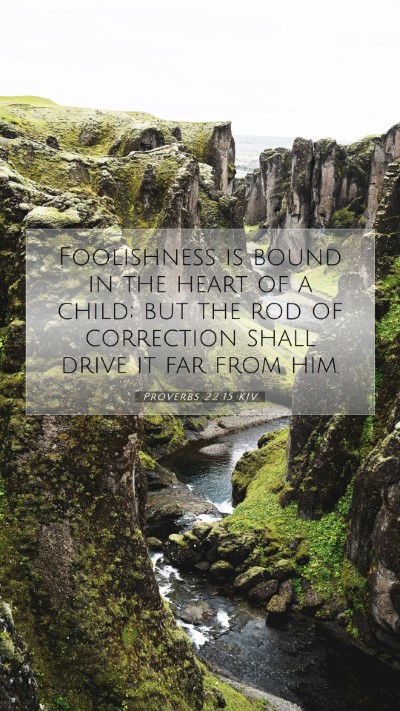Understanding Proverbs 22:15
Proverbs 22:15 states, "Foolishness is bound up in the heart of a child; but the rod of correction shall drive it far from him." This verse presents a profound insight into the nature of human behavior, especially concerning the upbringing of children.
Context and Meaning
This verse can be found within the wider context of the wisdom literature of the Bible, particularly in the Book of Proverbs, which emphasizes moral teachings and practical guidance for living righteously.
Foolishness in the Heart of a Child
Foolishness is depicted here as something innate within children. This perspective suggests that all children, by nature, have a propensity towards folly, which encompasses actions that can be harmful and unwise. The word "foolishness" can be interpreted as lack of sense or understanding, leading to poor choices and behavior. This aligns with Matthew Henry's commentary, which emphasizes that children's hearts are prone to evil and need guidance.
The Role of Discipline
The latter part of the verse shifts focus to discipline: “the rod of correction shall drive it far from him.” This phrase refers to the necessity of corrective measures in parenting. Albert Barnes notes that the “rod” symbolizes authority and the need for guidance in discipline. The wisdom literature underlines that without proper correction, foolishness can take root, leading to greater problems in the future.
Implications for Parenting
- Effective Disciplining: This verse serves as a reminder for parents about the necessity of discipline in the formative years, steering children away from foolishness.
- Balanced Approach: While correction is vital, it should be balanced with love and teaching to ensure that children understand the reasons behind the discipline.
Biblical Exegesis
This verse supports various themes found throughout Scripture regarding the importance of wisdom and instruction in a believer's life. Adam Clarke offers a detailed exegesis that identifies the cultural practices of correction prevalent during biblical times, emphasizing that the rod was not only a means of punishment but also a tool for shaping character.
Application of Proverbs 22:15
In assessing the practical significance of this verse for modern life, one can glean critical principles for both parenting and personal growth:
- Teaching Responsibility: Understanding that corrective action is essential in promoting growth and responsibility both in children and within ourselves.
- Seeking Wisdom: Encouraging a lifestyle that values wisdom as a direct antidote to foolishness.
Additional Bible References
Several other scriptures can be related to Proverbs 22:15, providing further insight into the combined teachings of discipline, wisdom, and understanding:
- Proverbs 13:24: “He who spares his rod hates his son, but he who loves him disciplines him promptly.”
- Proverbs 29:15: “The rod and reproof give wisdom, but a child left to himself brings shame to his mother.”
- Hebrews 12:11: “No discipline seems pleasant at the time, but painful. Later on, however, it produces a harvest of righteousness and peace for those who have been trained by it.”
Conclusion
In summary, Proverbs 22:15 encapsulates the wisdom that recognizing and correcting foolishness is vital in shaping the hearts and minds of children. Through discipline and guidance, individuals can foster wisdom that will guide them throughout their lives. The verse serves as an indispensable tool for anyone seeking a deep understanding of Scripture and its applications in daily life, providing meaningful insights for both Bible study groups and online Bible studies.


